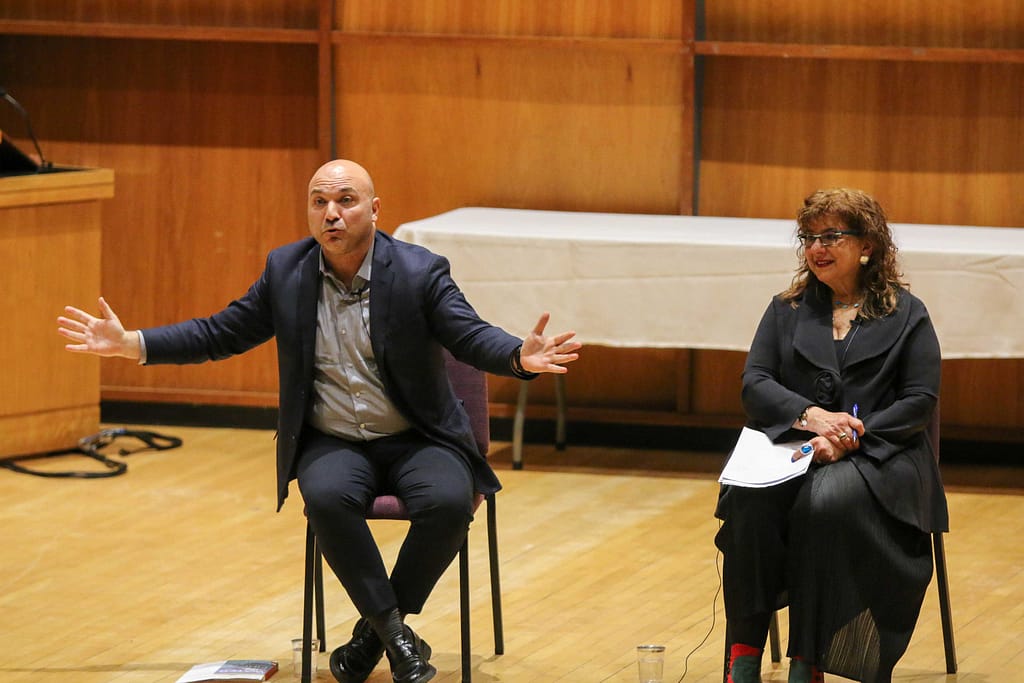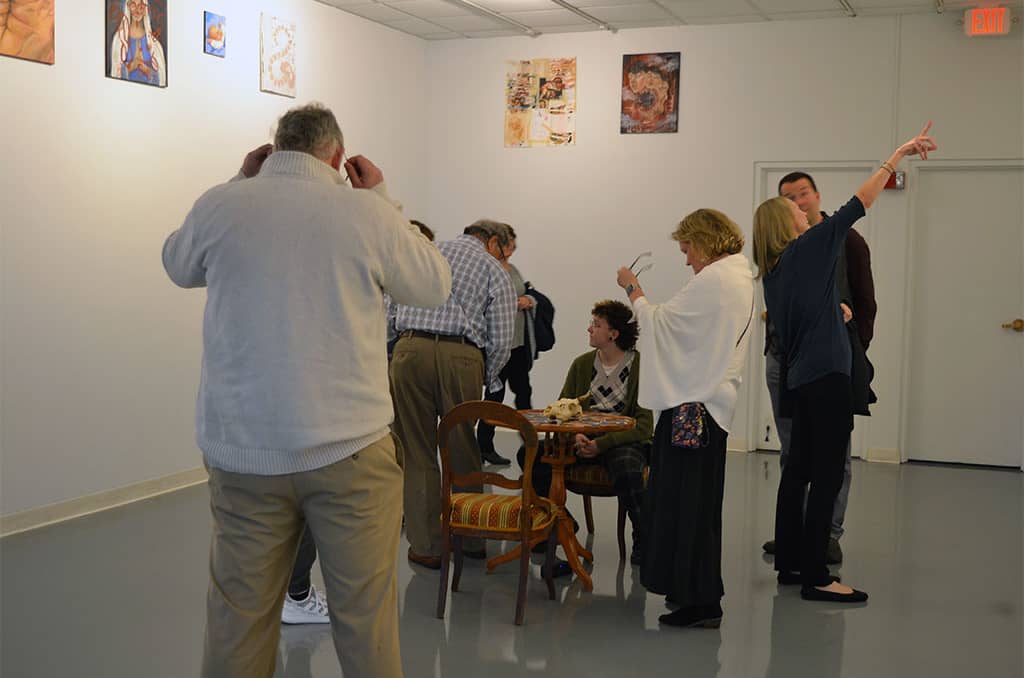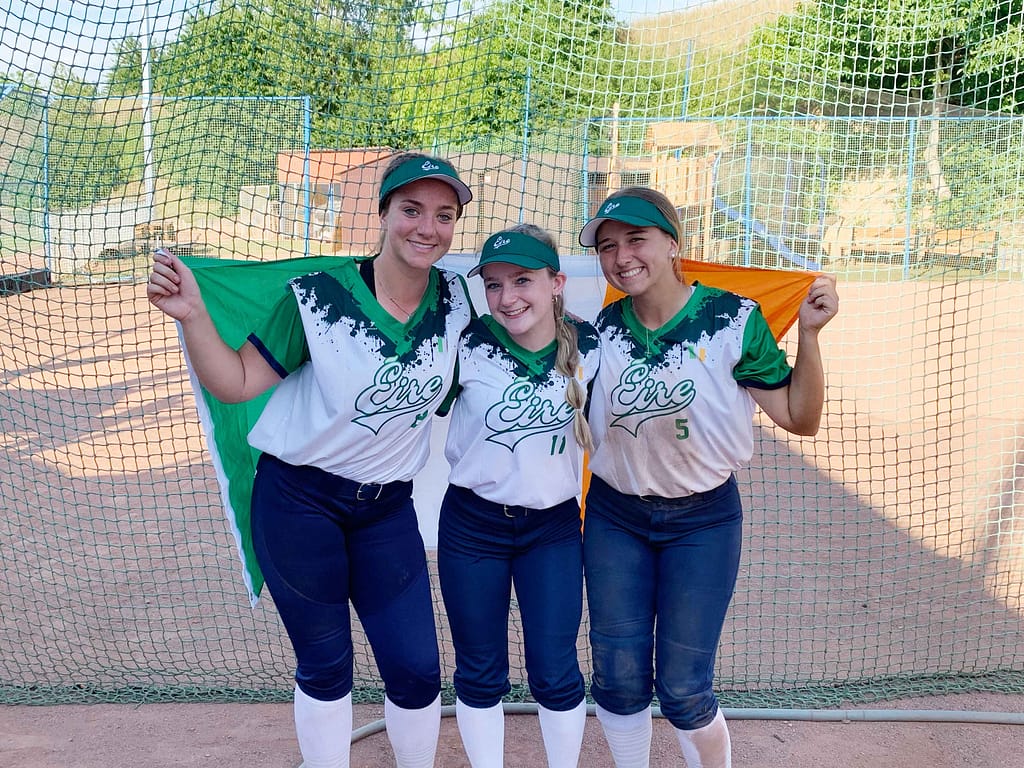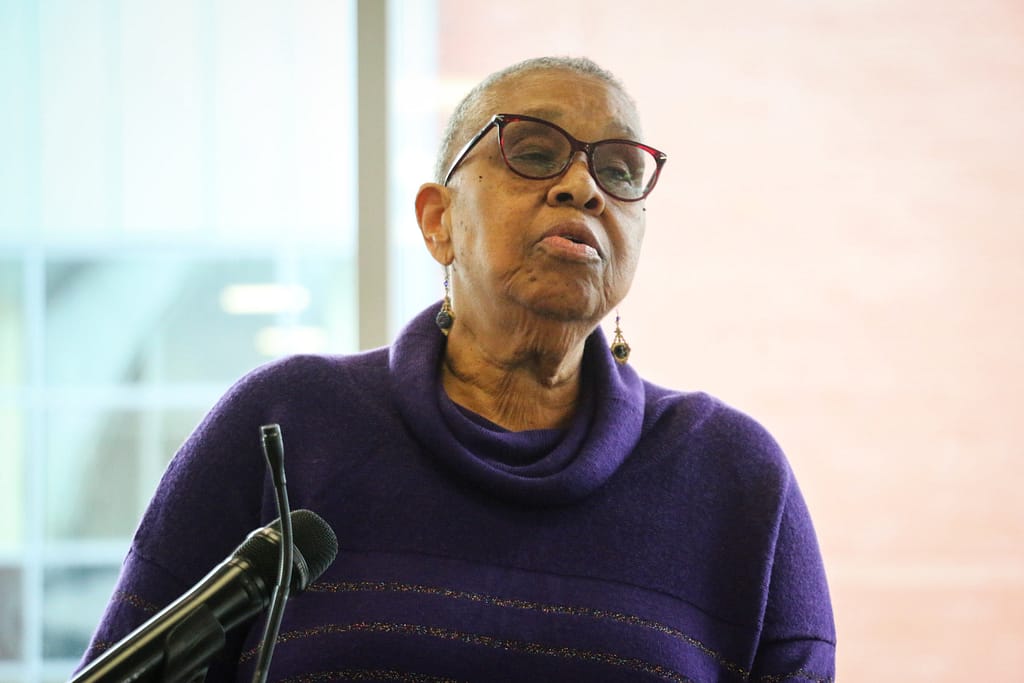Growth evident at summer research garden party

Students present their research on Friday, June 8: Large photo above headline is Kara Hettinger, directly above is Ellie Moore, photos below show Mitchell McDonald (left), Conor Macias (right), Lauren Stone and Keyana Smith (left in descending order) describing their summer research projects. (photos by Ethan Simmons)
Hearing close to 40 students from across the arts and sciences articulately describe their newly begun research projects during Friday’s First Summer Research Lunch in the Teaching Gardens meant even more than usual for Saint Michael’s President Jack Neuhauser as his presidency winds down this month, given the priority he has placed on expanding such opportunities at the College.
Intelligence, maturity and focus were on display as one student after another stood to share brief synopses of their work at the invitation of Karen Talentino, vice president of academic affairs — from an opening pair of women’s description of their chemistry lab work with David Heroux involving catalysts for reactions to remove textile dyes from wastewater, to a later impressive succession of astute young writers and literary scholars who told about their experience-informed books and stories being undertaken with one-on-one mentors.
All this represented the kind of work that will continue expanding (as it has exponentially in the past decade), now especially thanks to a new $1 million and growing fund that was recently established and named to honor the Neuhauser legacy of promoting such research.
“This has really been an amazing exploration of the variety of things that are being done and the depths at which these students go,” said the president after the last presentation from a large group under Ruth Fabian-Fine of biology who are studying aspects of neurotransmitters relevant to human health, using spiders and advanced neuroimaging equipment in a year-old lab, “and so I’m just wonderfully pleased that we’ll be able to support them for a while longer with this Fund – that’s a real joy.”
The first speakers about their research after a relaxed outdoor lunch picnic from Sodexo were the two chemistry students, Haley Poitras of Manchester, NH and Amanda Spink of Gorham, ME, on their impressively complex-sounding work involving catalysts, textile dyes and wastewater. Erin Williams, a senior biochemistry major working with Christina Chant of the chemistry faculty, then told how she will be using a new Nuclear Magnetic Resonance system (made possible by an alumnus gift) to explore compounds that might bring insights on proteins related to mad cow disease and chronic wasting disease. “Hopefully we can learn something about why they occur,” she said.
Samuel Vaal, chemistry major from Manchester, NH, is continuing work on a project begun over the past year exploring the effects humans have on the environment through copper and iron mining. Talentino mentioned how more students than usual are making use of Vermont sites on or near campus for various scientific or social studies. “They’re contributing to the understanding of the habitat,” she said, specially mentioning biology and environmental studies students gathering baseline data on a natural area across Route 15 that the College hopes to restore as natural habitat in coming years.
Joe Brach, pre-pharmacy major from Melrose, MA, for instance, said he is looking at contamination over years of human impacts and fossil fuels on campus tracts along the Winooski River that once were farms. Nick Seddy, environmental science major/rising senior, will study (under Scott Lewin of the biology faculty) moths that feed on onions and scallions and kale with a view to affecting yield on the campus farm; Ethan Brookner, environmental studies major from Minneapolis, MN, (mentored by Declan McCabe), said he is setting up motion-sensing cameras in wilderness areas and on campus to monitor the mammal populations, comparing overall biodiversity and see the impact of human development on campus and nearby trail areas. Kara Hettinger (Lindenhusrt, IL), environmental studies/political science double-major in large photo above headline, will use organic carbon content and pH values to assess soil at the Saint Michael’s College farm site, she said. Alyssa Valentyn ES major from Medford, MA, also will use trail cameras in McCabe’s work, with her focus on wetland vs. non-wetland mammals.
Emily Ferreri, a rising senior biology major working with Dagan Loisel of biology, told of looking at gamma herpes virus in the wild Vermont bobcat population, sequencing viral DNA extracted from bobcat spleens, which might offer insights about Epstein-barr in humans. 
Meghan Feenan of Groton, Mass., an education and environmental studies double major, has Jonathan Silverman of the education faculty guiding her as she looks at how students are exposed to conservation education – she’ll be observing Vermont-based programs in schools or summer camps. Her goal is to publish an article and create curriculum that she and others can use related to conservation.
Professor Trish Siplon of political science said while her students couldn’t attend since they were out in the field, they’ll be researching barriers to multicultural people in adventure sports, including in the Saint Michael’s Adventure Sports program. Sarah Rogers, environmental studies major from Cheshire, CT, will examine campus food security and the status and role of the campus farm. “I’ll be meeting with stakeholders to see what their role is in the food system starting on Tuesday,” she said of the coming week.
Maple syrup and sap are the focus of a project by Meghan Meyers, chemistry major working with Professor Christina Chant on “Quantitative Analysis of Maple Syrup and Sap! Drink Products.”
The next table to report out had some projects outside the sciences, such as Zachary Pierce, Burlington, VT, an economics major studying the effect of special compensation on re-enlistment rates in the U.S. armed forces. A challenge is isolating the pay effects from other factors that go into retention such as bonuses and how popular wars are at home, he told the group.
Abby Adams, a history and secondary education double-major guided by Claudine Bedell and Becky Wigglesworth of the education faculty, said she will be student teaching in the spring and this summer has the goal of understanding the rationale behind the Vermont state history curriculum and standards. Her product will be a presentation to help other teachers understand the curriculum; the main goal is improving curriculum to benefit students, she said, concluding, “History is inspired by real people making real decisions.”
Jonathan Burgess, English/philosophy double-major and medieval studies minor from North Reading, MA, said he will be looking at J.R.R. Tolkien’s work, and how “his work with language was crucial” to the later influence of Tolkien’s work in the fantasy fiction genre. Julia Meagan, psychology major from Wellesley, MA, is studying wilderness therapy for troubled teens, she said.
Rising senior Conor Macias (New Rochelle, NY, shown in photo at right)
Talia Lawrence of Newark, NJ, English/education major working with Liz Inness-Brown of the English faculty, said her project is writing a series of short stories that will explore life experiences that pertain to African American women and people of color. She told the group her own experience has been that books with the point of view she hopes to bring to her work are lacking largely. 
MaKayla Foster, elementary ed/English major from Middlebury, VT, said she will work on her memoirs centered on finding solace in nature during a time of adversity, drawing on her personal experiences growing up on a Vermont farm and appreciating “the peace of wild things.” Through the guidance of literature, she said, “I will discover my own voice and response to my life experiences through the lens of nature.” Keyana Smith of Queens, NY, (photo below left), English and religious studies double major, also will work on a memoir (with mentor Christina Root of the English faculty who also is helping Foster), which “focuses on my individual experience with poverty and race,” drawing inspiration from a nonfiction piece she wrote in a St. Mike’s creative nonfiction class titled “The Comedy in Poverty.” She looked in that piece at painful things through an optimistic lens, she said, and “through this found a way to transform suffering into an art through writing,” enabling a perspective shift bolstered by her reading of other African-
Ellie Moore, English and ES major from Marlborough, CT (top photo under headline), will work with Will Marquess of the English faculty to research the potential of an environmental literary publication at Saint Michael’s. Chase Plante, sociology and anthropology major with minor in French from Center Barnstead, NH, said Peter Vantine of the Modern Languages faculty will help him study revolutions, focusing on French revolutions and others that have shaped the world so much (and continue to). The French press has zeroed on this topic from a sociological view recently, he said, “so I seek to contribute another piece to this greater puzzle.”
The last group of 8 student biology researchers working with spiders and Ruth Fabian-Fine shared their hypothesis one at a time, each adding a piece and relevant details in turn — basically the thesis is that when a spider walks, different stimuli such as prey cause the release of small amounts of neurotransmitter in their legs depending on the stimulus; so their work looks at that possibility since spider neuro-systems are more easily accessible in the legs than in mammals, but have relevant similarities too.
“We have so much to learn from one another, and I’m so impressed,” said Talentino at the end, reminding students to attend ethics workshops in their fields later in June, and a final luncheon on July 24 to report on their findings.





